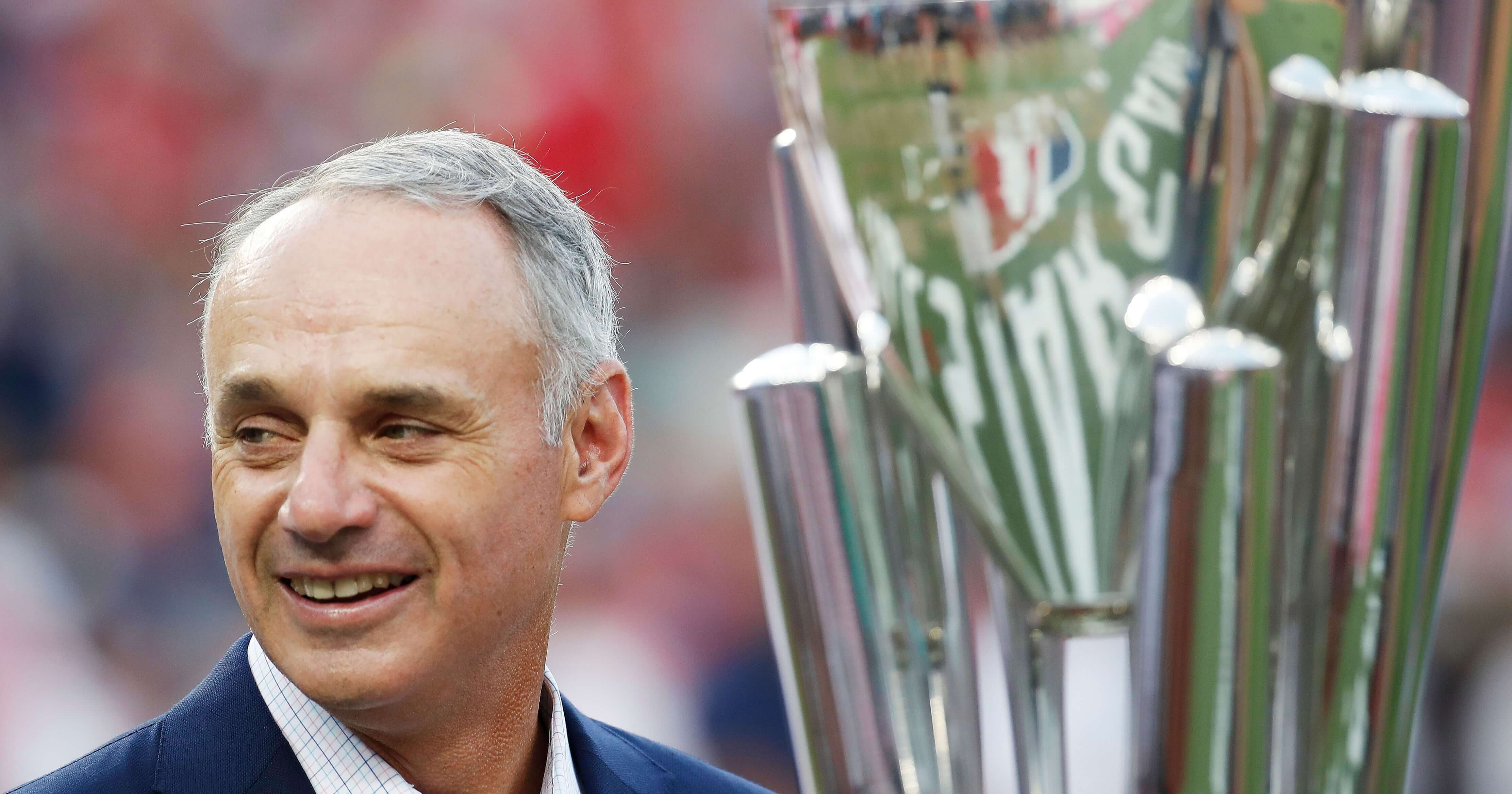
MLB facing potential work stoppage over rule changes and 'direct attack on free agency'
Major League Baseball wants a broad discussion with players about rule changes to combat decreased offense and longer games, an initiative likely to be met by a testy union stung by declining free-agent prices and already raising the possibility of a work stoppage after the 2021 season.
Commissioner Rob Manfred and players’ association head Tony Clark outlined their differing agendas during separate sessions with the Baseball Writers’ Association of America before Tuesday night’s All-Star Game.
“There is a growing consensus, or maybe even better an existing consensus, among ownership that we need to have a really serious conversation about making some changes to the way the game is being played,” Manfred said. “We are not at the point where I can articulate for you what particular rule changes might get serious consideration. I can tell you the issues that concern people: I think that the period of time between putting balls in play, the number of strikeouts, to a lesser extent the number of home runs, the significance of the shift and what it’s done to the game, the use of relief pitchers and the way starting pitchers are going to be used.”
Clark repeatedly maintained players are reluctant to change as “stewards of the game.”
“We may get to a point where those coming to the ballpark or have an interest in coming to the ballpark for whatever reason aren’t 100 percent certain that what they are seeing is the type of game that they want to see,” he said.
More than 100 free agents remained unsigned when spring training began this year. Many agreed to deals at a fraction of the price they thought they were worth and for fewer years than they expected.
“What we experienced last offseason was a direct attack on free agency, which has been a bedrock of our economic system, and if that is going to be different, then we have some very difficult decisions to make moving forward,” Clark said.
Baseball had eight work stoppages from 1972-95 but has had labor peace since. The current five-year contract runs through the 2021 season, and Clark left open a possible return to the era of strife.
“To the extent there are challenges to those rights, historically I would suggest those have manifested themselves in a particular way,” he said.
The union filed a grievance in February against Miami, Oakland, Pittsburgh and Tampa Bay, accusing the teams of failing to appropriately spend revenue-sharing money in an effort to improve their on-field product. Manfred dismissed the allegations, saying the grievance was filed “really for publicity reasons.”
Manfred said the lack of interest in free agents was due to the dearth of quality.
“At the end of the year you’ll look at the performance of those players,” he said. “I’m pretty sure, based on what’s already in the books, you’re going to make the judgment that the clubs made sound decisions as to how those players should be valued.”
Management is alarmed by what is taking place on the field. Strikeouts (24,537) are on track to surpass hits (24,314) for the first time. Strikeouts also are likely to set a record for the 12th straight season, and this year’s average of 17.0 per game is up from 12.6 in 2005. The current big league batting average of .247 would be the lowest since 1972.
There have been 20,587 shifts on balls in play, according to Baseball Info Solutions. That projects to a full-season total of 34,668 — up 29.8 percent from last year and an increase from 6,882 for the entire 2013 season. That has decreased the batting average of stars such as Washington’s Bryce Harper, who is hitting just .214.
And the average attendance of 28,568 is down from the 30,159 at the break last year, when the final figure was 30,042. MLB has not dropped below 30,000 since 2002.
Manfred blamed early season bad weather.
“We’ve made up some ground,” he said. “We were down as much as 8, 9 (percent) early, we were back to like 5.5 percent down, and I’m optimistic.”
Lack of competitiveness among rebuilding teams also is a likely factor. Three teams are on track to lose 100 or more games, which would match the record set in 2002, and five others are on a pace for 90 or more defeats.
Clark called the attendance drop “dramatic” and said while weather is partly to blame “the concerns that fans have in regards to the competitive integrity piece is one of them” along with “players being moved from teams that fans had a connection with.”
While he wouldn’t cite teams for tanking, Clark said it appears many clubs are deciding to rebuild if analytics tell them they can’t compete to win the World Series.
“This is only what I am hearing, that teams are making decisions against the backdrop of what they believe their roster is going to yield and the landing place of where their team is going to be at the end of the year, that those data points suggest if you’re not in a particular place, then it may make more sense not to look to be the last team standing,” he said.
The Western Journal has reviewed this Associated Press story and may have altered it prior to publication to ensure that it meets our editorial standards.
Truth and Accuracy
We are committed to truth and accuracy in all of our journalism. Read our editorial standards.
Advertise with The Western Journal and reach millions of highly engaged readers, while supporting our work. Advertise Today.











